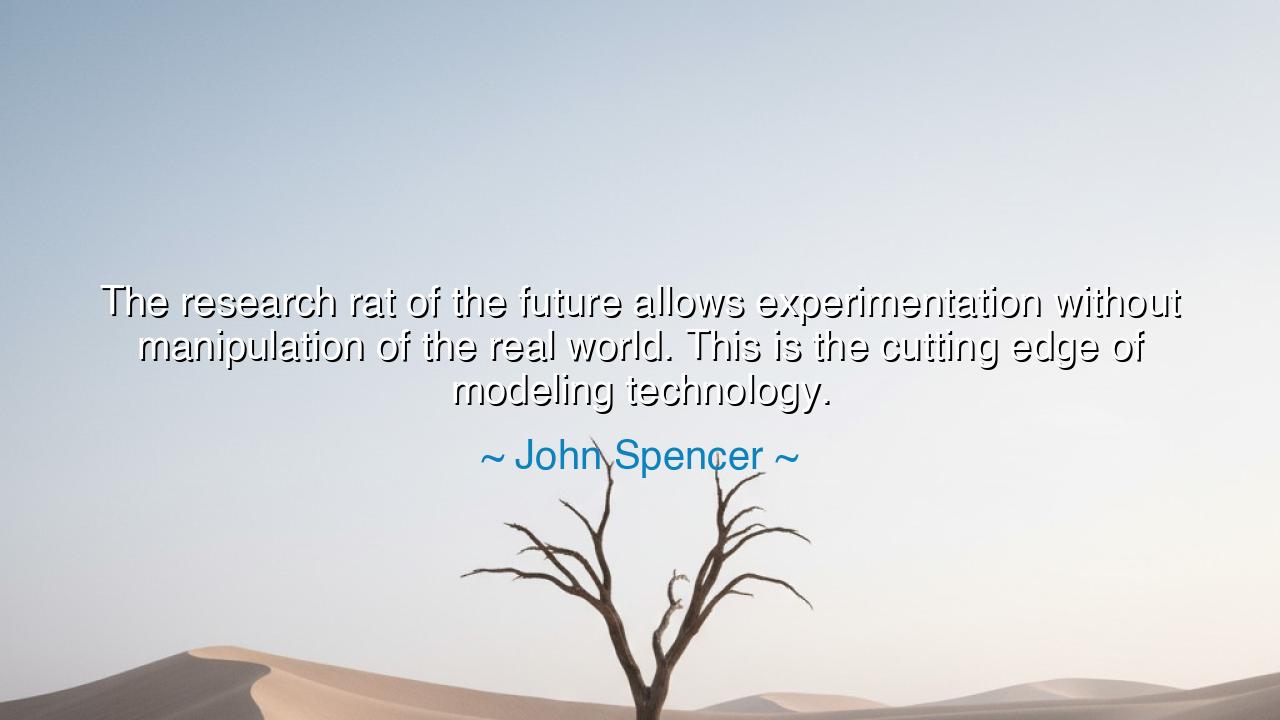
The research rat of the future allows experimentation without
The research rat of the future allows experimentation without manipulation of the real world. This is the cutting edge of modeling technology.






In the annals of human progress, few realms have seen such a dramatic evolution as our ability to understand and manipulate the forces of the natural world. John Spencer’s words, "The research rat of the future allows experimentation without manipulation of the real world. This is the cutting edge of modeling technology," touch upon a profound shift in how we approach the very process of discovery. In an age where the boundaries between the physical world and the virtual are becoming increasingly blurred, Spencer highlights the power of simulation—a tool that enables us to explore the vast possibilities of the world without the limitations and ethical concerns of traditional experimentation.
The ancients understood the value of experimentation and observation in their quest for knowledge. Aristotle, the great Greek philosopher, is often called the father of scientific inquiry, and his systematic approach to studying the natural world set the foundation for much of modern science. Yet even Aristotle was bound by the limitations of his time, unable to simulate or replicate experiments beyond the confines of nature. His studies on biology and physics were groundbreaking, yet they were still dependent on the tangible, the real world. What Spencer envisions—the ability to experiment without manipulating the real world—takes the ancient idea of observation and experimentation and propels it into a new realm where the very fabric of reality itself can be modeled and explored without physical constraints.
This advancement echoes the Renaissance, a period of great innovation and exploration. During this time, Leonardo da Vinci and other polymaths sought to understand the world through the power of models and sketches. Leonardo’s famous anatomical drawings, though based on dissections of real bodies, were also early models of the body—attempting to simulate the real world in order to understand its workings. Yet, like Aristotle, Leonardo could not escape the physicality of his world. He was constrained by the very nature of his materials and tools. Spencer’s quote suggests a leap forward, where the tools of science allow us to simulate life’s processes without having to manipulate or harm the real world.
In Rome, Vitruvius, the renowned architect, relied heavily on models to design buildings that would withstand the tests of time. His famous work, De Architectura, included detailed principles on how to create structures that were both functional and beautiful. But like the ancients, Vitruvius had to rely on the physical construction of models and actual buildings to test his theories. Spencer’s vision, however, suggests a future where we can create models of buildings, systems, and even life forms in a virtual world, testing and tweaking them before any real-world construction takes place. The Renaissance and Roman approaches were groundbreaking in their day, but Spencer’s insight reveals a potential that stretches beyond the limits of the material world.
The scientific revolution marked another critical leap in human understanding. Figures like Galileo and Newton utilized models and mathematics to describe the natural world in ways that had never been done before. But even these great thinkers were bound by the physical world. Their ability to observe, experiment, and simulate was constrained by their need to rely on the real world as a basis for their theories. In contrast, Spencer’s vision of the future suggests a world where we can explore theoretical ideas and concepts in a purely digital or virtual realm—free from the limitations of the physical world. This is not simply a continuation of the past, but a revolution in how we approach knowledge and discovery.
The key lesson from Spencer’s words is the immense power of simulation as a tool for both scientific advancement and ethical responsibility. In the past, experimentation often required direct manipulation of the environment or living beings—an act that sometimes resulted in harm. Modeling technology, on the other hand, allows us to explore ideas without the ethical concerns of traditional experimentation. Just as the ancients used their models to understand the world, we now have the ability to simulate the world itself. This empowers us not only to push the boundaries of knowledge but to do so in ways that preserve the integrity of the real world.
In practical terms, we must embrace this new era of simulation and modeling to advance our understanding of everything from the environment to human behavior. Whether in medicine, where virtual models of human organs can help us test new treatments, or in climate science, where we can simulate the effects of global warming without experimenting on the planet, the potential is limitless. Like the ancients, we must approach these new tools with both courage and responsibility. We should use modeling technology not just to create, but to understand, predict, and preserve the world we live in. Let us heed Spencer’s call to use this technology to become agents of change—transforming knowledge into action that is both innovative and respectful of the world around us.






AAdministratorAdministrator
Welcome, honored guests. Please leave a comment, we will respond soon